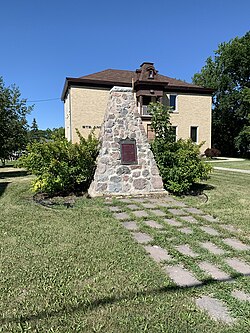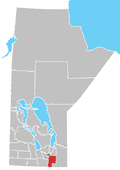Rural Municipality of Ste. Anne
Ste. Anne | |
|---|---|
Rural municipality | |
| Rural Municipality of Ste. Anne | |
 RM of Ste. Anne Municipal office with Dawson Road monument in front | |
 Location of the RM of Ste. Anne in Manitoba | |
| Coordinates: 49°37′07″N 96°34′15″W / 49.61861°N 96.57083°W | |
| Country | Canada |
| Province | Manitoba |
| Region | Eastman |
| Incorporated | February 1881 |
| Amalgamated | 1890 |
| Re-incorporated | 1908 |
| Named for | Sainte-Anne, New Brunswick |
| Government | |
| • Mayor | Richard Pelletier[1] |
| Area | |
| • Land | 476.81 km2 (184.10 sq mi) |
| Elevation | 263 m (863 ft) |
| Population | |
• Total | 5,584 |
| • Density | 10.5/km2 (27/sq mi) |
| Time zone | UTC-6 (Central Standard Time) |
| Postal code | R5H |
| Website | rmofsteanne |
Ste. Anne (French: Municipalité rurale de Sainte-Anne) is a rural municipality (RM) in the Eastman Region of Manitoba, Canada, lying southeast of Winnipeg. The separately-administered town of Ste. Anne lies within the geographic borders of the municipality, in its northwestern part.[3]
It includes Paradise Village, a 55-plus retirement community, founded in early 1990, many of whose residents are "snowbirds". The municipality has five privately-owned public golf courses—Cottonwood, Oakwood, Ridgewood, Girouxsalem, and Quarry Oaks—and five privately-owned campgrounds—Lilac, Wild Oaks, Rock Garden, Ridgewood and Cherry Hill.[3]
The municipality is one of the earliest-settled areas of Manitoba.[4]
History
[edit]The first settlers of Ste. Anne arrived in 1856 at Pointe-des-Chênes ('where the oaks meet') from Quebec in search of farmland. The main industry within this initial settlement to the area, which included 198 families, was purposed towards supplying lumber for the construction of the Saint Boniface Cathedral. By the end of the decade, the Hudson's Bay Company established a trading post in the community, which eventually brought the settlement a hotel, general store, and a jail.[4]
The Rural Municipality of Ste. Anne was incorporated in February 1881, but soon after amalgamated with the Rural Municipality of LaBroquerie in 1890. Nearly two decades later, in 1908 the RM of Ste. Anne became re-established by an Act of the Legislature.[4]
Communities
[edit]Demographics
[edit]In the 2021 Census of Population conducted by Statistics Canada, Ste. Anne had a population of 5,584 living in 1,981 of its 2,092 total private dwellings, a change of 11.6% from its 2016 population of 5,003. With a land area of 476.81 km2 (184.10 sq mi), it had a population density of 11.7/km2 (30.3/sq mi) in 2021.[2]
See also
[edit]References
[edit]- ^ "Information". Rural Municipality of Ste. Anne. Retrieved November 23, 2021.
- ^ a b "Population and dwelling counts: Canada, provinces and territories, and census subdivisions (municipalities), Manitoba". Statistics Canada. February 9, 2022. Retrieved February 20, 2022.
- ^ a b "About the RM of Ste Anne - RM of Ste Anne". www.rmofsteanne.com. Retrieved August 7, 2021.
- ^ a b c "History of the RM of Ste. Anne - RM of Ste Anne". www.rmofsteanne.com. Retrieved August 7, 2021.

